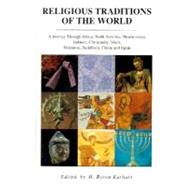Religious Traditions of the World
, by Earhart, H. Byron- ISBN: 9780060621155 | 006062115X
- Cover: Hardcover
- Copyright: 8/1/1992
The Zulu andTheir Religious TraditionThe Origins of the Zulu PeopleThe origins of the Zuli people are shrouded in the mists of oral tradition. But by using a variety of specialized methods, scholars have been able to penetrate the mists and discover some of the Zulu past. They have concluded that within the last two thousand years there have been a series of migrations of large numbers of people from central Africa into the southern part of the continent. These migrants from the north had a linguistic identity, and they are referred to as Bantu-speaking peoples. This means that although these people spoke many different languages the languages were similar enough in form and structure to deserve a common name, Bantu. Scholars chose the name Bantu because this word, meaning "people; ' occurs in a large array of languages spoken by the migrants. These people slowly settled the southeastern area of Africa all the way down to what is now known as the province of Natal in the Republic of South Africa. As they settled the land they began to form special groups. One large group is now known as the Nguni people. The Nguni group consisted of many tribes and clans: the Xhosa, the Fingo, the Tembu, the Pondo, the Swazi, and the Zulu. This process of migration and solidification into special groups, each with a distinct language, was complete by the seventeenth century.The Zulu at this stage of development were one group of people among many. According to their own traditions, an ancestor named Malandela had two sons named Qwabe and Zulu. These two sons became the chiefs of two clans. Chief Zulu extended his quest for territory until he came to the Mfolosi Valley, an area north of theThukela River in the present-day province of Natal. There Chief Zulu settled. His clan remained stable and unremarkable until the renowned Zulu chief Shaka (1787-1828) emerged as a dynamic leader and warrior at the beginning of







